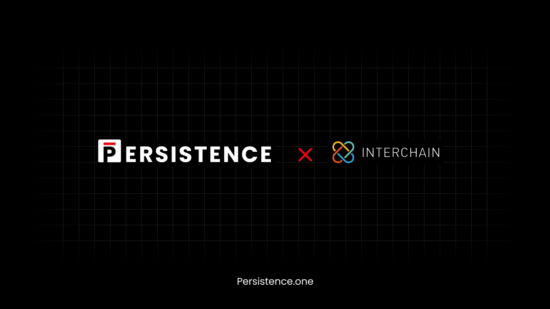Note: Persistence has pivoted to liquid staking and building DeFi primitives to increase the utility for staked assets. This article is only for archive purposes.
(Visit here to read our latest blogs)
We are thrilled to share with our community that the Interchain Foundation (ICF), a forerunner in decentralized technologies, awarded Persistence One a grant to develop Interchain Standards (ICS) for Non-Fungible Tokens (NFTs) and Metadata. Persistence One, with its strong expertise in building interchain operable technology, has been one of the most active contributors in the Cosmos ecosystem.
The Interchain Foundation has been leading efforts for the advancement of Interoperability which has recently become a major catalyst for the rapid growth of the cryptocurrency industry.
Persistence One’s mission is to bridge the gap between DeFi and Traditional finance by bringing in real-world assets on to the Blockchain. Real-world assets are tokenized using NFTs. These NFTs can then be used as collateral to borrow cryptoassets (stablecoins). Persistence One was one of the first teams to build out a native interchain NFT transfer.
Over the coming months, the Persistence One team will be working closely with the Interchain Foundation and Ixo to identify NFT and Metadata use-cases to design Interchain Standards. The team led by Persistence CTO, Deepanshu Tripathi, will be collaborating with multiple projects in the Cosmos ecosystem to discover their requirements around NFT and Metadata use cases while deriving native definitions of NFT.
Join the NFT and Metadata Working Group to be part of the discussions and contribute to the development of Interchain Standards for NFT and Metadata.
Significance
The Cryptocurrency ecosystem has seen a huge surge in innovation and adoption with more than 50 million active users (Source: Statista) around the world. Yet, the collective market cap of the industry is less than 0.01% of the traditional economy and this is because of the limited exposure to real-world assets on the chain.
For the Cryptocurrency industry to expand significantly and achieve mass adoption, the gap between the traditional and digital economy needs to be bridged. With inherent characteristics such as ownership rights, verifiability, and authenticity, Non-fungible Tokens (NFTs) serve as a catalyst in bridging this gap.
The first dApp in the Persistence ecosystem, Comdex, is built from the ground up using the Persistence SDK. Comdex is a physical commodities marketplace with over $30 Million in trade volume already. Comdex uses NFTs to tokenize real-world assets such as invoices and trade receivables, to bring institutional capital into the cryptocurrency industry.
Motivation
There are a lot of limitations with the current NFT definition by ERC721 standards:
- They are biased towards smart contract-based definitions of NFT
- The smart contract-based approach for NFT implementation doesn’t account for a common native wallet that may hold multiple kinds of NFTs
- Allow only for a singular definition transfer NFT transaction
These limitations make it very difficult for cross-chain implementations and the ERC721 interface definitions don’t provide the flexibility of app chain-based native implementations.
Persistence One proposes a solution to these problems – Native NFTs which are not biased towards smart contracts like the ERC721 standards – which aims to make the interface simple leading to a growing number of use-cases/implementations of NFTs and metadata.
What do we aim to achieve with this grant?
- Distil down a very basic NFT interface that all data structures must implement to be classified as an NFT and an NFT wallet interface that can hold the ownership of all such NFT implements for an account.
- Define a base implementation of the NFT and NFT wallet interfaces as modules with mint, mutate metadata and burn transactions for base NFT and transfer ownership transactions for the base NFT wallet implementation.
- Define a metadata module to maintain the metadata kvStore utilized for storing the NFT metadata. This module may be further utilized for storing metadata for objects from other modules too.
- Extend the transfer NFT functionality of the base NFT wallet implementation to define packet data structure, app logic and encoding for interchain NFT ownership transfers and define the ICS specification.
- Produce tutorials and documentation around the interfaces and base modules to operate, compose with other modules and extend/implement the definitions.
How will it help the Ecosystem?
This will allow all projects in the cosmos ecosystem to:
- Define their own implementation of NFT structures with custom mint, mutation and burn transaction logic maintained at their app chain.
- Have a common wallet implementation for all NFT implementations which can hold ownership information of multiple kinds of NFTs from multiple chains in a single wallet for an account.
- Natively send the ownership of the NFT across chains through Inter-Blockchain Communication (IBC) without a requirement for permissioned bridges or token transformation/pegging.
How will Persistence leverage Interchain standards?
Persistence One’s mission is to facilitate seamless exchange of value around the world to increase the speed and efficiency of cross-border trade and financing to close the $1.5 Trillion financing gap.
Persistence One provides a platform to power Debt Marketplaces that match entities with surplus capital (lenders) to entities that require capital (borrowers).
Persistence follows a three-step process to facilitate this:
Asset tokenization — tokenization of real-world assets through document fingerprinting of invoices using NFTs to capture all the unique metadata
Asset Exchange (NFT Marketplace/DEX) — trading/exchange of tokenized real-world assets against Stablecoins
Financing / Liquidity Pools — usage of NFT assets (representing invoices) as collateral to borrow/lend Stablecoins through Stablecoin liquidity pools
Once a real-world asset has been tokenized into an NFT, it is free to be traded or used as collateral to finance business needs in a quick, easy and global manner.
About Persistence
Persistence is a Tendermint-based, specialised Layer-1 network powering an ecosystem of DeFi applications focused on unlocking the liquidity of staked assets.
Persistence facilitates the issuance and deployment of liquid-staked stkASSETs, allowing users to earn staking rewards while participating in DeFi primitives, such as lending/borrowing and liquidity provisioning on DEXs.
Persistence aims to offer a seamless staking and DeFi experience for PoS (Proof-of-Stake) users and enable developers to build innovative applications around stkASSETs.
Join Our Movement
Twitter | LinkedIn | Telegram | YouTube | Reddit | [email protected]





